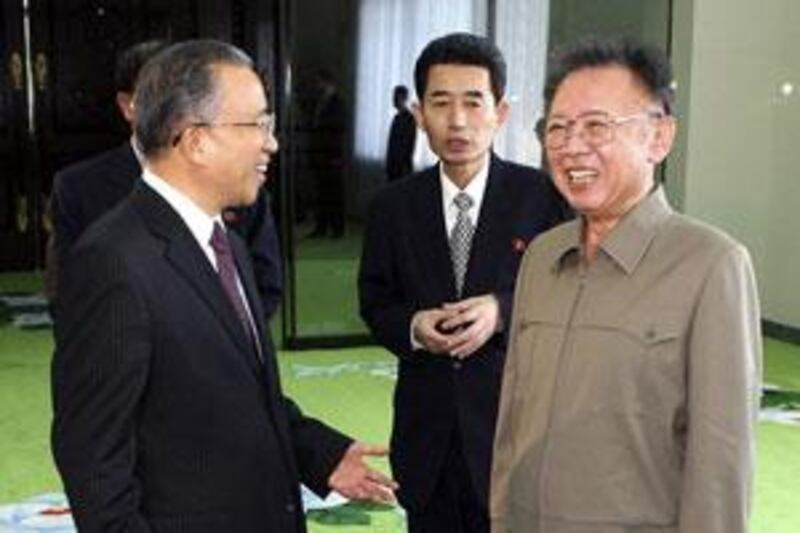BEIJING // After a recent visit by a high-level Chinese envoy to Pyongyang, the North Korean leader, Kim Jong Il, expressed willingness to resume nuclear negotiations through bilateral and multilateral talks. This reversal highlights the much touted "China factor" in the North's politics, and may mark the beginning of a change in the country's nuclear strategy, analysts say. In talks last Friday with the Chinese president Hu Jintao's heavyweight envoy, Dai Bingguo, Mr Kim said his country is willing to resolve the nuclear dispute through "bilateral or multilateral talks", China's official Xinhua News Agency reported. Earlier this year, North Korea quit six-party denuclearisation talks in China that aimed to persuade the North to give up its nuclear programmes. The multilateral talks included South Korea, China, Japan, Russia and the US. Kurt Campbell, the US assistant secretary of state for East Asia and Pacific affairs, said he understood Mr Kim's remarks during the meeting with Mr Dai to be "in line with the US position" that any bilateral contact between the two countries should be held within the six-party framework. "It sounds as if North Korea is underscoring that it will accept those conditions," Mr Campbell told reporters in Tokyo on Friday on a trip to meet the new Japanese government. Washington announced last week that it would deal one-on-one with North Korea and its leader, Mr Kim, who the US president Barack Obama said yesterday is "pretty healthy and in control", citing an assessment by former president Bill Clinton after his trip to Pyongyang. Although North Korea's state media did not confirm the Chinese report, nor mention Mr Campbell's comments, his optimism is probably well-founded, particularly because the latest North Korean overtures were a product of Chinese pressure. "It's worth paying attention to Dai Bingguo's role," said Baek Seung-joo, an analyst at the Korea Institute for Defence Analysis in Seoul. Mr Dai holds the post of state councillor, a powerful position within the State Council, the executive organ of China's central government. He ranks above the ministers of many government ministries. He has been at the forefront of Beijing's efforts to engage Pyongyang and he headed the Chinese delegation in July to the China-US Strategic and Economic Dialogue in Washington, together with the vice premier, Wang Qishan. Last month, he met with the South Korean president Lee Myung-bak's brother, Lee Sang-deuk, who flew to Beijing as a presidential envoy. After these consultations with his American and South Korean counterparts, Mr Dai, known for his diplomatic finesse, "very likely pressured North Korea to show a forthcoming posture by stipulating China's position and the disadvantages North Korea will face if it doesn't", Mr Baek said. China's position as middle man is delicate. Although North Korea is its staunch ideological ally, if Pyongyang continues its nuclear drive, China, as a member of the UN Security Council and a new power seeking international respectability, has no choice but to support UN sanctions on the North, which could damage their relationship. "China likely told North Korea that if the North returns to the six-party talks, it would not side with other Security Council members ... on stricter sanctions, which might prove to be 'fatal' to North Korea," Mr Baek said. Jin Jingyi, a North Korea expert at Peking University in Beijing, gave high marks to Mr Dai for the results of his recent mission to North Korea. "I am optimistic. The meeting has two highlights. One is that Kim Jong Il reiterated his commitment to the denuclearisation of the Korean Peninsula. The other is North Korea's expression of its willingness to participate in multilateral nuclear negotiations," Mr Jin said. As the host of the six-nation nuclear negotiations that have been held on and off since 2003, China is keen to maintain the platform, for which its role as a moderating force has been highlighted. Beijing's success as a mediator in the negotiations, observers said, can offset some of the doubts about China, which has risen to become the world's third largest economy, but has yet to garner full respect from the international community for lingering issues on human rights, the environment and ethnic conflicts. "When we talk about multilateral talks, the six-party talks are the only platform. We cannot think about anything else," said Mr Jin, the Chinese analyst. Lee Hee-ok, an expert on the China-North Korea relationship at Sungkyunkwan University in Seoul, agreed and said the productive outcome of the Chinese envoy's visit to North Korea underscores the active consultation occurring between China and the US on the issue. But other observers say China and the US are ultimately competing for the initiative on the North Korean nuclear issue, pointing to the North's expression of willingness to return to both bilateral and multilateral talks as evidence. They say North Korea's willingness to engage in the six-party talks reflects its consideration of China's pressure, while its acceptance of bilateral talks reflects US interest. In any case, Mr Lee said the China-North Korea consultation is an important starter for something potentially much bigger. "There is a big change beneath the surface. This might eventually lead to a big change, such as establishing liaison offices between North Korea and the US," he said. slee@thenational.ae
Pyongyang open to nuclear talks
In a significant change to its strategic posture, North Korea now appears willing to resume multilateral denuclearisation negotiations.

Editor's picks
More from the national




